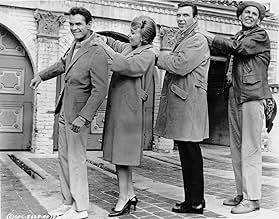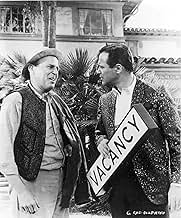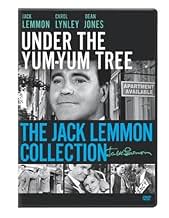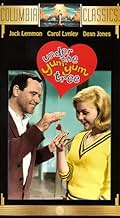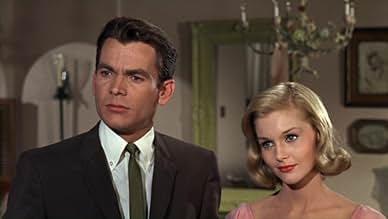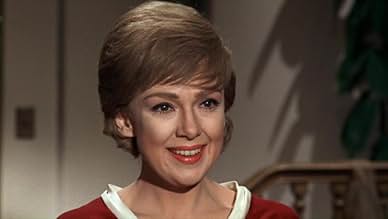NOTE IMDb
6,0/10
2,2 k
MA NOTE
Ajouter une intrigue dans votre langueA horny, love-struck landlord tries to convince a pretty young tenant to dump her fiancé and give him a chance.A horny, love-struck landlord tries to convince a pretty young tenant to dump her fiancé and give him a chance.A horny, love-struck landlord tries to convince a pretty young tenant to dump her fiancé and give him a chance.
- Réalisation
- Scénario
- Casting principal
- Récompenses
- 2 nominations au total
Jerry Antes
- Adam
- (non crédité)
Tom Anthony
- Barber
- (non crédité)
Army Archerd
- Writer
- (non crédité)
Phil Arnold
- Delivery Man
- (non crédité)
Roger Bacon
- Writer
- (non crédité)
Bill Bixby
- Track Team Coach
- (non crédité)
Paul Bradley
- Barbershop Customer
- (non crédité)
Françoise Bush
- College Girl
- (non crédité)
Gloria Calomee
- Sandy
- (non crédité)
Cliff Carnell
- Athletic Instructor
- (non crédité)
Avis à la une
I've been catching up on a few of these early sixties semi-sex comedies, while in Covid essential isolation. I'm starting to fall in love with Carol Lynley though sadly, she died about a year ago. Jack Lemmon is always funny and interesting, Edie Adams is forever appealing and Paul Lynde, as the frustrated repressed wannabe letch is amusing to watch.
Yes, I was entertained throughout, yes it was relatively original and yes, I recommend it. However, it does go on for a bit too long without veering direction and there's never a moment when you don't know where it's going to end up. It was, after all, 1963, when the Hays code was starting to be lifted but wasn't quite there yet. Young people in the country were preparing for the sexual revolution but they weren't quite there yet, either. By 1967, the year of Bonnie and Clyde, The Graduate and the year after Who's Afraid of Virginia Woolf, the dynamic between this couple would have been entirely different. And by 1974, the film could have gone in a wide assortment of directions. In 1963, again at the time of the almost sex comedy, there was really only one way this film could go. Watching it get there was entertaining but again, it needed a few more turns and twists to justify the length.
Norman Fell's landlord character from The Graduate ended up as the landlord on Three's Company. It might have been interesting to see this landlord replace him.
Yes, I was entertained throughout, yes it was relatively original and yes, I recommend it. However, it does go on for a bit too long without veering direction and there's never a moment when you don't know where it's going to end up. It was, after all, 1963, when the Hays code was starting to be lifted but wasn't quite there yet. Young people in the country were preparing for the sexual revolution but they weren't quite there yet, either. By 1967, the year of Bonnie and Clyde, The Graduate and the year after Who's Afraid of Virginia Woolf, the dynamic between this couple would have been entirely different. And by 1974, the film could have gone in a wide assortment of directions. In 1963, again at the time of the almost sex comedy, there was really only one way this film could go. Watching it get there was entertaining but again, it needed a few more turns and twists to justify the length.
Norman Fell's landlord character from The Graduate ended up as the landlord on Three's Company. It might have been interesting to see this landlord replace him.
Lawrence Roman's popular stage farce comes to the screen seeming a bit undernourished, with everyone playing 'perky' to perfection but without benefit of any funny lines. With a whole apartment complex full of sexy, single gals, landlord Jack Lemmon becomes fixated on innocuous college girl Carol Lynley, who has just moved in with her boyfriend--a platonic arrangement that has Lemmon up in arms (and on the roof!). A shiny package with nothing inside, and Lemmon visibly strains to give the proceedings some bounce (tough to do since his wolfish character is thoroughly loathsome). The script, adapted by David Swift (who also directed), tries for snappy repartee, but since none of the characters are particularly sharp, the results here lack wit, sparkle and imagination. *1/2 from ****
I'm sure that the reason Jack Lemmon was cast in the screen version of Under the Yum Yum Tree was the resemblance of his character of the landlord Hogan here with the part that got him his first Oscar, Ensign Frank Pulver in Mister Roberts. Superficially there is a resemblance.
But the womanizing frat boy gone to sea in Mister Roberts is behaving under acceptable standards. It's kind of expected that men act out their sexual fantasies being deprived of it when on sea duty. Those stories about sailors on shore leave aren't an exaggeration.
In Under the Yum Yum Tree it's as though Frank Pulver was left an inheritance of an apartment building which is obviously strategically located near a co-ed campus. What was acceptable behavior for Lemmon in Mister Roberts is unbelievable in this situation.
Try as he might Lemmon cannot make this character likable. He's a rich guy who never worked a day in his life which apparently is devoted to being a peeping tom in regard to all the beautiful young women he rents to. And he only rents to young women.
When you think about it, it's pretty darn scary. I can't believe one of these girls hasn't called the police on him.
On Broadway the play was a five character thing and only Dean Jones came over from Broadway. Lemmon, Carol Lynley's part, and Edie Adams part were taken by Gig Young, Sandra Church, and Nan Martin. Under the Yum Yum Tree had a respectable run of 173 performances on Broadway.
But if this is what the theater audience saw, how did it run so long?
But the womanizing frat boy gone to sea in Mister Roberts is behaving under acceptable standards. It's kind of expected that men act out their sexual fantasies being deprived of it when on sea duty. Those stories about sailors on shore leave aren't an exaggeration.
In Under the Yum Yum Tree it's as though Frank Pulver was left an inheritance of an apartment building which is obviously strategically located near a co-ed campus. What was acceptable behavior for Lemmon in Mister Roberts is unbelievable in this situation.
Try as he might Lemmon cannot make this character likable. He's a rich guy who never worked a day in his life which apparently is devoted to being a peeping tom in regard to all the beautiful young women he rents to. And he only rents to young women.
When you think about it, it's pretty darn scary. I can't believe one of these girls hasn't called the police on him.
On Broadway the play was a five character thing and only Dean Jones came over from Broadway. Lemmon, Carol Lynley's part, and Edie Adams part were taken by Gig Young, Sandra Church, and Nan Martin. Under the Yum Yum Tree had a respectable run of 173 performances on Broadway.
But if this is what the theater audience saw, how did it run so long?
Ben Mankiewicz noted on TCM that Jack Lemmon was not happy being assigned this film version of a semi-hit Broadway sex comedy from 1960, and you can see why. As the libidinous landlord of a California complex who rents out only to nubile young things, he's playing an absolutely awful man, and for all his comic finesse, he's charmless and irritating. In Lawrence Roman's oversexed plot (he adapted his play with director David Swift), Lemmon's Hogan mistakenly rents a beautiful one bedroom (for $75 a month; oh, to be in 1963) to undergrad Carol Lynley, who plans to share it platonically with her fiancé, Dean Jones, who had played this part on Broadway. And from there it's one long smirk, with Lynley wiggling her fanny in short-short outfits, Jones bemoaning how difficult a no-sex policy is, and Lemmon mugging and being thoroughly unpleasant. Edie Adams, as Lemmon's ex and Lynley's aunt, is a pro, and Paul Lynde, as a horny-for-young-girls (ha) gardener, and Imogene Coca, as his disapproving wife, wring what laughs they can out of repellent material. If you want to know what '60s sex comedies were like, with endless jokes on will-she-won't- she-lose-her-virginity, this is a good example, typically over lit and supplemented with a cutesy Frank DeVol score. And Lynley and Jones are charming. But given the change in morality in intervening years, it looks it was made on another planet.
A sleezy landlord (Jack Lemon) who only rents to pretty young and single women accidently rents to a couple who a trying some modern relationship plan....for the early 60s. They plan to get married after college and hope to avoid getting a divorce in the future. Thus. They decide to live together, without any physical intimacy, to see if they are compatible with everyday life stuff. Jack Lemon is lurking around their personal life. Will he try to sneak the woman away from the boyfriend or give him advice about trying to survive this new arrangement without succumbing to hanky panky. All the topics are dripping with humor and some physical comedy. Good for a few corny laughs.
Le saviez-vous
- AnecdotesTo help out his friend Edie Adams financially after her husband Ernie Kovacs's sudden death left her debt-ridden, star/co-producer Jack Lemmon not only insisted upon hiring her for this film, but further insisted that her part be expanded considerably from the original stage play to give her more work.
- GaffesRobin comes up to the door of her apartment with a bag of groceries, which includes two upside-down bunches of celery (root end up), and a square-shaped box of eggs. Then as the camera angle switches to show her coming through the door, the two bunches of celery have suddenly switched to right side up (leafy end up), and the square box of eggs has magically turned into a rectangular shaped box.
- ConnexionsFeatured in Hollywood and the Stars: The Funny Men: Part 2 (1963)
Meilleurs choix
Connectez-vous pour évaluer et suivre la liste de favoris afin de recevoir des recommandations personnalisées
Détails
- Durée1 heure 50 minutes
- Rapport de forme
- 1.85 : 1
Contribuer à cette page
Suggérer une modification ou ajouter du contenu manquant

Lacune principale
By what name was Oui ou non avant le mariage ? (1963) officially released in India in English?
Répondre

